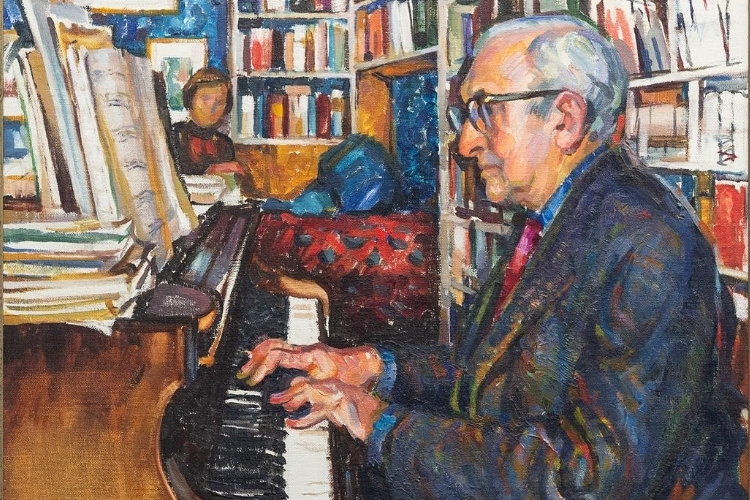I read with interest Marcus Jackson’s account on the SOUNZ site, of Frederick Page’s first meeting with Stravinsky. I first heard Page’s account of this meeting in about 1964 at a student evening at his house in Hobson Street over wine and one of Eve Page’s delicious casseroles but the version given us on that occasion was rather more colourful and possibly less plausible than the account Marcus provided. Professor Page always took delight in stating the outrageous – he often said that one of his aims was to clean out the woolly ears of his 100 level students. Thus his statements of “why can’t we get unsalted butter in New Zealand?” and “why does New Zealand offer only Cheddar or Colby Cheese – and I completely disregard Chesdale as a cheese at all” were as much to alarm those of us fresh off our Taranaki dairy farms as they were to stun us with the alternatives.
There is no question that the Victoria University Music Department in particular, and New Zealand music in general gained a great deal from Professor Page’s overseas tours. He did indeed open our minds to exciting new vistas, introducing us to worlds beyond Bach, Mozart, Beethoven and Tchaikowsky. We heard Britten’s War Requiem within weeks of the recording being produced. Schoenberg’s Pierrot Lunaire, Boulez’s Piano Sonata and the Klavierstücke of Stockhausen were all essential listening. Visiting artists added to the mix. As chairperson of the Department’s Music Society I was called on to introduce a visiting young composer, Peter Maxwell Davies. “Who’s he?” I asked. Prof filled me in. Douglas Lilburn’s Electronic Music Studio was established under Page’s regime and clearly his legacy has continued through the works of Jack Body, John Psathas, Dugal McKinnon etc.
As a lecturer in the history of music from the 5th century to the present day he was indeed a well informed and most effective teacher. Adopting the upright, relaxed posture appropriate to an apostle of the Alexander Technique, dressed in his pale, shapeless Donegal Tweed suit and peering through his thick glasses, his light, mellifluous voice wafted out the differences between the Ars Antiqua and the Ars Nova, the dramatic elements of the St Matthew Passion, the magic of the Mozart Piano Concertos. Interestingly my only memory of the Romantics are of his lectures on Liszt’s Years of Pilgrimage and Mussorgsky’s Boris Godunov before we quickly skipped forward to Debussy. I had to wait some time before I discovered the subtle orchestrations of Puccini or the vitality and fluency of Elgar. It is inevitable though regrettable that even the best teachers cannot help but instil their prejudices along with their enthusiasms.

Image courtesy of the Page Family, Wellington
Professor Page’s lecturing style reflected his aim of as much moulding the minds as imparting information. An introduction to a subject might be taken up by freely talking around the topic, playing music excerpts, throwing in anecdotes etc. When relating the intricacies of Stravinsky’s Symphonies of Wind Instruments, Professor Page recalled the difficulties members of the NZSO experienced in rehearsing this work in preparation for a concert during Stravinsky’s visit to New Zealand. Finally Professor Page suggested that they call down to the St George Hotel and ask Stravinsky’s assistant Robert Craft if he could take the rehearsal. On hearing this, Stravinsky insisted that he should come as well. Robert Craft sorted out the technical difficulties and as they were leaving, Stravinsky said to Page, “you have a group of very fine music students here”. Page looked over at the group of rather tired middle aged men, but nonetheless thanked him for the compliment.
Once the introductory freewheeling was over, Professor Page would pick up his hard covered exercise book stuffed with loose leaf pages (his “Recipe Book”), and proceed to dictate notes. I still have copies of some of these notes and they are excellent: clear concise summaries of the topic at hand. Learn these and you pass the exam. Add to these his introductory meanderings and you’ve picked up the true flavour of the music.
And now to address Version Two of Professor Page’s first meeting with Stravinsky. This version agrees in most part with your publicised Version One. Certainly the event was at a rehearsal for the premiere of Threni in Venice. As Page related it to us over the Mateus Rosé (this was the 1960s, remember!), on approaching the theatre he was turned away by the guard who sat behind a high desk at the stage door. Fred walked away, then quietly returned on his hands and knees and crawled unseen past the doorman, through heavy curtains, to be faced with a pair of small neat leather shoes. Fred got to his feet and found himself face to face with Stravinsky. On introducing himself Stravinsky remembered a letter he’d received which was a request that Stravinsky be patron of the University Music Society (the previous patron, Vaughan Williams, having died). Stravinsky had replied but seemingly his letter had not been received by the University. Thus the comment about the New Zealand postal service. Which Version is true? Probably Version One, though Version Two does conjure up an amazing image or two.
